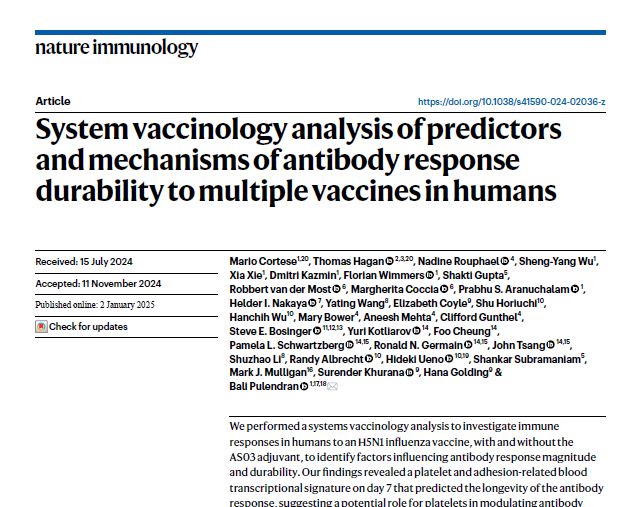System vaccinology analysis of predictors and mechanisms of antibody response durability to multiple vaccines in humans.
We performed a systems vaccinology analysis to investigate immune responses in humans to an H5N1 influenza vaccine, with and without the AS03 adjuvant, to identify factors influencing antibody response magnitude and durability. Our findings revealed a platelet and adhesion-related blood transcriptional signature on day 7 that predicted the longevity of the antibody response, suggesting a potential role for platelets in modulating antibody response durability. As platelets originate from megakaryocytes, we explored the effect of thrombopoietin (TPO)-mediated megakaryocyte activation on antibody response longevity. We found that TPO administration enhanced the durability of vaccine-induced antibody responses. TPO-activated megakaryocytes also promoted survival of human bone-marrow plasma cells through integrin β1/β2-mediated cell-cell interactions, along with survival factors APRIL and the MIF-CD74 axis. Using machine learning, we developed a classifier based on this platelet-associated signature, which predicted antibody response longevity across six vaccines from seven independent trials, highlighting a conserved mechanism for vaccine durability.
Authors
Cortese M, Hagan T, Rouphael N, Wu SY, Xie X, Kazmin D, et al.
External link
Publication Year
Publication Journal
Associeted Project
Systems Vaccinology
Lista de serviços
-
As antisense RNA gets intronic.As antisense RNA gets intronic.
-
Androgen responsive intronic non-coding RNAs.Androgen responsive intronic non-coding RNAs.
-
Conserved tissue expression signatures of intronic noncoding RNAs transcribed from human and mouse loci.Conserved tissue expression signatures of intronic noncoding RNAs transcribed from human and mouse loci.
-
The intronic long noncoding RNA ANRASSF1 recruits PRC2 to the RASSF1A promoter, reducing the expression of RASSF1A and increasing cell proliferation.The intronic long noncoding RNA ANRASSF1 recruits PRC2 to the RASSF1A promoter, reducing the expression of RASSF1A and increasing cell proliferation.
-
Antisense intronic non-coding RNA levels correlate to the degree of tumor differentiation in prostate cancer.Antisense intronic non-coding RNA levels correlate to the degree of tumor differentiation in prostate cancer.
-
Insight Into the Long Noncoding RNA and mRNA Coexpression Profile in the Human Blood Transcriptome Upon Leishmania infantum Infection.Insight Into the Long Noncoding RNA and mRNA Coexpression Profile in the Human Blood Transcriptome Upon Leishmania infantum Infection.
-
Long non-coding RNAs associated with infection and vaccine-induced immunityLong non-coding RNAs associated with infection and vaccine-induced immunity
-
Comparative transcriptomic analysis of long noncoding RNAs in Leishmania-infected human macrophagesComparative transcriptomic analysis of long noncoding RNAs in Leishmania-infected human macrophages
-
SARS-CoV-2 Selectively Induces the Expression of Unproductive Splicing Isoforms of Interferon, Class I MHC, and Splicing Machinery Genes.SARS-CoV-2 Selectively Induces the Expression of Unproductive Splicing Isoforms of Interferon, Class I MHC, and Splicing Machinery Genes.

